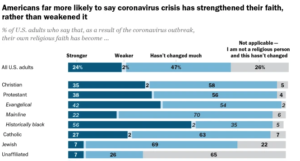During this period of reflection as coronavirus takes its toll on daily life, some outlets have peddled the idea that the UK is experiencing some kind of religious revival. It’s not…
Met with a crisis, and with many of us still in lockdown, the nation has had time to reflect on the way we live our lives. I haven’t spoken to a single person who has not been moved in some way by a new sense of community, or hasn’t spent time reevaluating what is important to them. ‘Pre-’ and ‘post-’ coronavirus have become markers for a collective shift in values.
Whilst that shift is quite evident – and who knows how long it will last – any analysis that this has anything to do with religion is misleading. I was astonished by headlines in The Guardian and New Statesman:
‘British public turn to prayer as one in four tune in to religious services’
The Guardian (3 May 2020)
‘How coronavirus is leading to a religious revival’
New Statesman (27 April 2020)
The Guardian headline was particularly misleading, The data used from a ComRes survey actually show that while 5% say they have begun praying, 6% say they have stopped. In any case most people don’t pray and don’t go to church. Even the article in The Guardian goes on to say that 95% of us haven’t changed our prayer habits, and 75% of us haven’t tuned in to a religious service. An accurate headline would have been:
‘British public turn slightly away from prayer (most of them still don’t pray anyway)’
Why some newspapers have used this period of reflection to create illusions of a religious revival is unclear. Are these simple, attention-grabbing headlines for journalists looking for coronavirus-related stories – perhaps with a church press release to hand – or proof of confirmation bias? Whatever the case, it strikes me as an off-colour attempt to grab attention in a time of crisis.
The Financial Times (23 May 2020) had a longer feature, mostly on the US but also covering the UK under the headline:
‘Keeping the Faith: how a pandemic reinvigorated religion’
It was very interesting in parts, looking at how the virus has changed people’s religious practices, but in no way justified the headline but it contained such unsubstantiated claims as ‘The coronavirus crisis may be unprecedented but, as with previous moments of turbulence, it has triggered a search for the divine.’ and in one respect it was quite misleading. It showed this graph to justify its claim of ‘reinvigorated religion’:
When I asked Pew Research Center about this data and they showed it to me, however, it turned out the graph looked like this, showing in fact that a plurality of Americans said their faith was unaffected:
Many may not wish to return to a pre-lockdown life and media commentators are searching for stories adjacent to that theme, but one thing is clear: we are not experiencing a religious revival, and the vast majority continue to neither pray nor go to church. What we’re experiencing is collective re-evaluation of how we can live ethical and fulfilling lives in a post-coronavirus world. That’s something we are all experiencing and considering together, and it would be better for special interest groups not to try to make sectarian capital out of it or “prove” a point they have always wanted to make.

